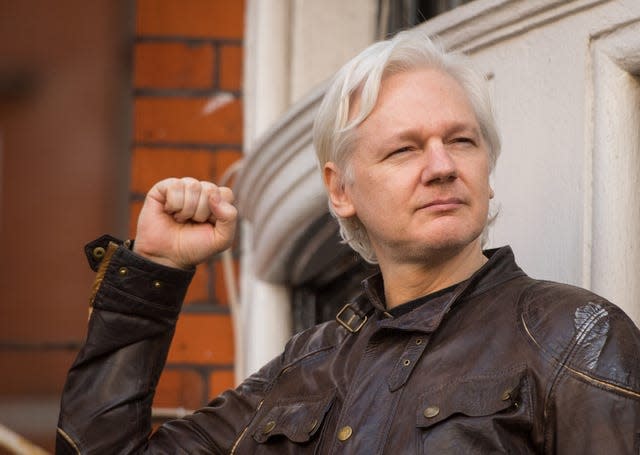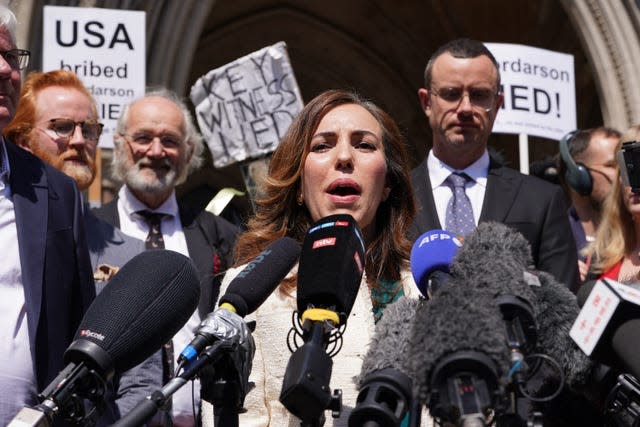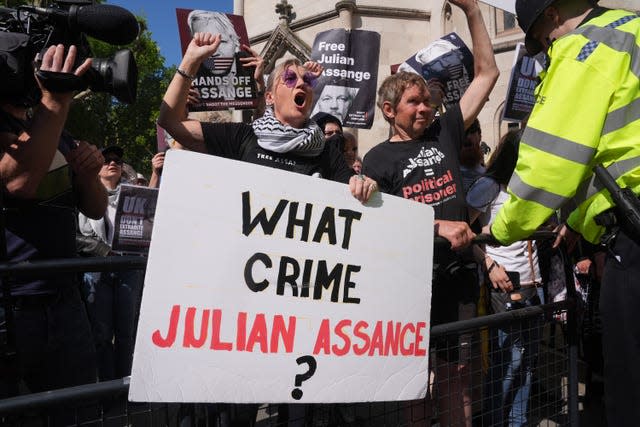Julian Assange wins bid to bring appeal against extradition
Julian Assange has won a bid to bring an appeal against his extradition to the United States at the High Court.
Assange faces prosecution in the US over an alleged conspiracy to obtain and disclose national defence information following the publication of hundreds of thousands of leaked documents relating to the Afghanistan and Iraq wars.
During a two-day hearing in February, lawyers for the 52-year-old asked for the go-ahead to challenge a previous judge’s dismissal of his case to prevent his extradition.

Dame Victoria Sharp and Mr Justice Johnson dismissed most of Assange’s legal arguments but said that unless “satisfactory” assurances were given by the US, he would be able to bring an appeal on three grounds.
Those assurances were that Assange would be protected by and allowed to rely on the First Amendment – which protects freedom of speech in the US – that he is not “prejudiced at trial” due to his nationality, and that the death penalty is not imposed.
And, at a hearing on Monday, the two judges granted permission for the challenge over the freedom of speech and nationality points, meaning Assange will be able to bring the appeal.
Hundreds of people had gathered outside the Royal Courts of Justice in London for the hearing, with supporters cheering as news of the decision filtered out of the courtroom.
Members of Assange’s legal team and family, including his wife, Stella Assange, and his father, John Shipton, attended the hearing, and could be seen embracing after the ruling.
During the approximately two-hour hearing, lawyers on behalf of the US had said Assange’s bid to bring an appeal should be refused given the promises, provided in a note from the US embassy in London.

James Lewis KC said in written submissions that there is “no question” that Assange, if extradited, “will be entitled to the full panoply of due process trial rights, including the right to raise, and seek to rely upon, the first amendment as a defence”.
He later told the court: “The assurance does make it clear that he will not be discriminated against because of his nationality.
“He can and will be able to raise all those arguments and his nationality will not prejudice a fair trial.”
Edward Fitzgerald KC, for Assange, said most of the promises were “blatantly inadequate” but that they had accepted the promise about the death penalty.
Discussing the other points, the barrister said: “This assurance is not and cannot be a knockout. It cannot reassure the court that there is no risk.”
In written submissions, Mr Fitzgerald said that, while the assurance over the death penalty was “an unambiguous Executive promise”, the other assurance does not give “any reliable promise as to future action”.
The barrister added: “What needs to be conclusively removed is the risk that he will be prevented from relying on the first amendment on grounds of nationality.”

In her previous judgment, which deferred some of the arguments to Monday’s hearing to allow for the assurances from the US, Dame Victoria said: “If he is not permitted to rely on the First Amendment because of his status as a foreign national, he will thereby be prejudiced, potentially very greatly prejudiced, by reason of his nationality.”
She concluded: “It follows that it is arguable that the applicant might be treated differently at trial on the grounds of his nationality.”
In a January 2021 ruling, then-district judge Vanessa Baraitser said Assange should not be sent to the US, citing a real and “oppressive” risk of suicide, while ruling against him on all other issues.
Later that year, US authorities won their High Court bid to overturn this block, paving the way towards Assange’s extradition.
However, if ultimately successful with his appeal, Assange could avoid extradition, though a further appeal from the US would be likely.

 Yahoo Sport
Yahoo Sport 





































